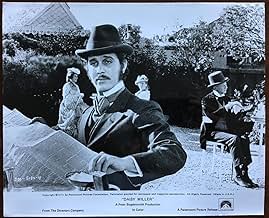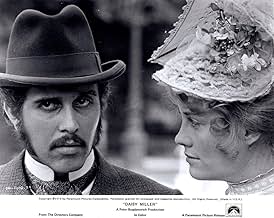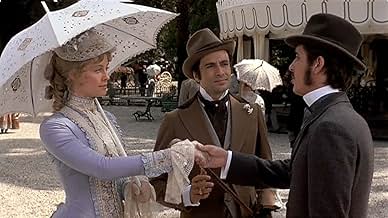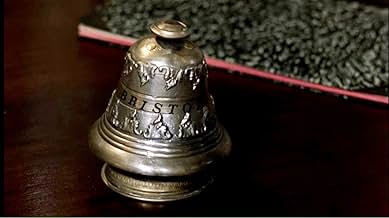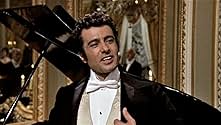IMDb रेटिंग
6.2/10
2.2 हज़ार
आपकी रेटिंग
अपनी भाषा में प्लॉट जोड़ेंIn this comedy of manners, Frederick Winterbourne tries to figure out the bright and bubbly Daisy Miller, only to be helped and hindered by false judgments from their fellow friends.In this comedy of manners, Frederick Winterbourne tries to figure out the bright and bubbly Daisy Miller, only to be helped and hindered by false judgments from their fellow friends.In this comedy of manners, Frederick Winterbourne tries to figure out the bright and bubbly Daisy Miller, only to be helped and hindered by false judgments from their fellow friends.
- निर्देशक
- लेखक
- स्टार
- 1 ऑस्कर के लिए नामांकित
- 1 जीत और कुल 1 नामांकन
फ़ीचर्ड समीक्षाएं
For his first film un color Peter Bodanovich chose a most curious and arcane subject, 19th century novel by Henry James. Daisy Miller on screen is an Americaniized version of onr of those films that the Merchant-Ivory team do
so well with for British subjects.
Our title role is played by Cybill Shepherd and Daisy is a rather ingenuous girl traveling with her mother Cloris Leachman and much younger brother James McMurtry. They're over from, Schenectady where the father made big money and employed a lot of the town.
The Millers are the subject of much gossip by other expatriate Americans like Mildred Natwick and Eileen Brennan. Mainly because they don't know the ropes and Daisy scandalizes them by going out unescorted and with European men who are after American virtue and money.
Barry Brown is Natwick's nephew and an expatriate student. He's the only one who finds Shepherd intriguing, but won't break convention.
Shot on location in Switzerland and Rome the film really captures the look and feel of 19th century Europe. Daisy Miller got an Oscar nomination for costume design. It's beaitifully crafted and sad that the film did not do so well at the box office.
I guess Henry James was out of season.
Our title role is played by Cybill Shepherd and Daisy is a rather ingenuous girl traveling with her mother Cloris Leachman and much younger brother James McMurtry. They're over from, Schenectady where the father made big money and employed a lot of the town.
The Millers are the subject of much gossip by other expatriate Americans like Mildred Natwick and Eileen Brennan. Mainly because they don't know the ropes and Daisy scandalizes them by going out unescorted and with European men who are after American virtue and money.
Barry Brown is Natwick's nephew and an expatriate student. He's the only one who finds Shepherd intriguing, but won't break convention.
Shot on location in Switzerland and Rome the film really captures the look and feel of 19th century Europe. Daisy Miller got an Oscar nomination for costume design. It's beaitifully crafted and sad that the film did not do so well at the box office.
I guess Henry James was out of season.
It almost feels mean to criticise Cybill Shepherd for being so unsuitable for this role, as she is so miscast. She plays the Daisy of the title, and is dull. When we first meet her, she's a pretty, spoilt, self-obsessed tease, and that's it. 90 minutes later that's still it. Barry Brown (Frederick) is, unfortunately, equally dull and one-note. Frederick chases Daisy, she teases him, and repeat until the end credits. That's a tough watch - especially when you've seen Ms Shepherd do it before, more concisely. Mr Brown has few expressions which give a hint of anything inside him that we may care to know more about. This film needed stars, or, at least, compelling character actors. The boredom is relieved by occasional flashes of melodrama in Eileen Brennan's eyes (but even they become repetitive), and some lovely photography, but the whole is empty of story, character, history, social milieu; even the dialogue goes on too much and is either commonplace or flatly rendered. There are moments of interesting observation, but there are scant. I shall read the Henry James story on which the film is based and try to work out what it was that the makers of this vacant film were striving for.
I strongly disagree with the limited, parochial, and dismissive comments of other reviewers' comments. Daisy Miller is a superb and literal adaptation of the Henry James novella. It is still a joy to watch and enjoy this period piece which is perfectly cast. I completely agree with Orson Welles that Cybill Shepherd was born to play Daisy Miller. Her performance is effortless and she aptly embodies Daisy in both looks and spirit. Bogdanovich was right on the mark with the casting of Ms. Shepherd. While it is true she was his girl friend at the time, it is also true that she was perfect for the role. Her interpretation involves rushing through the dialogue as if she couldn't wait for a response so she in turn could reply and in this case it is exactly what Daisy would have done. Cybill Shepherd was at the apex of her beauty and talent in Daisy Miller. She had just starred in three great American films-Last Picture Show, Heartbreak Kid, and Taxi Driver. Daisy Miller could easily be considered along with the three aforementioned film. When I am bored with high tech films, loud action adventure films, and post modern films, I often return with great pleasure to the sumptuous and beautifully realized Daisy Miller.
Many reviewers here seem to have confused the story and characters with the film and the actors.
Yes, Daisy in the film is rather flat and monotonous. But that's a high compliment -- that the ravishing Cybill Shepherd could so accurately portray such a flat character. Henry James at one point describes Daisy's expression as a "light, slightly monotonous smile", in another her voice as a "little soft, flat monotone". He says late in the story that "there was always, in her conversation, the same odd mixture of audacity and puerility". No, she wouldn't be a very pleasant person to be around for long. But that was part of James's point: that our attraction to people (especially those of the opposite sex) often defies reason. Shepard makes the point well.
Some have commented that they wished the story had been filled out. Some of those apparently haven't read the story. One of those critics even places the story wrong by forty years. Though called a novella, it's barely more than a short story. In fact the film does a remarkable job of portraying the events and (more importantly) the characters very much as they are in the story. The great majority of the dialog in the film is verbatim from the story.
In some instances, the scenes and characters were significantly expanded from the James story. How far should a director go, if the aim is to film a classic story, not just to make something derived from that story? James's characters were pretty flat, a lot flatter than those in the film. One could justifiably criticize the film for telling the story far better than James did.
Do you think James's story is dated and flat in the modern world? Well, in many ways so do I. A polemical assault on discrimination based on manners and birth is truly dated. Yet an assault on personal discrimination remains fully current. The modern world is certainly not devoid of personal discrimination. Perhaps it's not often so ugly, not in the first world anyway, but prejudice is very much alive.
James's story is also unsubtle: two groups of people with differing views, one person caught with one foot in each camp, unhappy results. That's about it. Should one film the classic story, or build something different? It's a choice; great films have been made both ways. The choice for this film was unambiguous: to film the classic story.
The photography is truly gorgeous -- the film (at least the outdoor parts) was shot on location in Vevey, Switzerland and Rome, Italy. Despite the long stretches of dialog, including Daisy's run-on commentaries, one need not strain to understand the words. If the story were as good as the production and acting (several good performances) then this would be a 10. The faithfulness to the original weights it down.
Yes, Daisy in the film is rather flat and monotonous. But that's a high compliment -- that the ravishing Cybill Shepherd could so accurately portray such a flat character. Henry James at one point describes Daisy's expression as a "light, slightly monotonous smile", in another her voice as a "little soft, flat monotone". He says late in the story that "there was always, in her conversation, the same odd mixture of audacity and puerility". No, she wouldn't be a very pleasant person to be around for long. But that was part of James's point: that our attraction to people (especially those of the opposite sex) often defies reason. Shepard makes the point well.
Some have commented that they wished the story had been filled out. Some of those apparently haven't read the story. One of those critics even places the story wrong by forty years. Though called a novella, it's barely more than a short story. In fact the film does a remarkable job of portraying the events and (more importantly) the characters very much as they are in the story. The great majority of the dialog in the film is verbatim from the story.
In some instances, the scenes and characters were significantly expanded from the James story. How far should a director go, if the aim is to film a classic story, not just to make something derived from that story? James's characters were pretty flat, a lot flatter than those in the film. One could justifiably criticize the film for telling the story far better than James did.
Do you think James's story is dated and flat in the modern world? Well, in many ways so do I. A polemical assault on discrimination based on manners and birth is truly dated. Yet an assault on personal discrimination remains fully current. The modern world is certainly not devoid of personal discrimination. Perhaps it's not often so ugly, not in the first world anyway, but prejudice is very much alive.
James's story is also unsubtle: two groups of people with differing views, one person caught with one foot in each camp, unhappy results. That's about it. Should one film the classic story, or build something different? It's a choice; great films have been made both ways. The choice for this film was unambiguous: to film the classic story.
The photography is truly gorgeous -- the film (at least the outdoor parts) was shot on location in Vevey, Switzerland and Rome, Italy. Despite the long stretches of dialog, including Daisy's run-on commentaries, one need not strain to understand the words. If the story were as good as the production and acting (several good performances) then this would be a 10. The faithfulness to the original weights it down.
I agree with the above comments. Miss Shepherd's simpering performance sabotaged what was otherwise a very good film. Subtle, amusing in all the right places and well-directed by Peter Bogdanovich. Unfortunately Bogdanovich was so taken with Cybill Shepherd he failed to see that she was wrong for the part. She is outshone by a brilliant supporting cast including Cloris Leachman as the weak-willed mother and Eileen Brennan as a spiteful society woman. Henry James has never transferred well to the screen; one thinks of the disastrous "Portrait Of A Lady" where Nicole Kidman was colourless as Isabel Archer. This is about the best of the movies adapted from James (perhaps with the exception of "The Heiress" which was an adaptation of "Washington Square") and it benefits from its' sumptuous location photography - it was filmed in Switzerland and Rome.
क्या आपको पता है
- ट्रिवियाAccording to Peter Bogdanovich, Hollywood legend Orson Welles said that actress Cybill Shepherd was born to play Daisy Miller, but he didn't want to direct Daisy Miller (1974).
- भाव
Annie P. 'Daisy' Miller: I'm a terrible, frightful flirt. Did you ever hear of a nice girl that wasn't? But now I guess you'll tell me I'm not a nice girl.
- कनेक्शनFeatured in Daisy Miller: An Introduction by Peter Bogdanovich (2003)
टॉप पसंद
रेटिंग देने के लिए साइन-इन करें और वैयक्तिकृत सुझावों के लिए वॉचलिस्ट करें
- How long is Daisy Miller?Alexa द्वारा संचालित
विवरण
बॉक्स ऑफ़िस
- बजट
- $22,00,000(अनुमानित)
- चलने की अवधि1 घंटा 31 मिनट
- ध्वनि मिश्रण
- पक्ष अनुपात
- 1.85 : 1
इस पेज में योगदान दें
किसी बदलाव का सुझाव दें या अनुपलब्ध कॉन्टेंट जोड़ें




